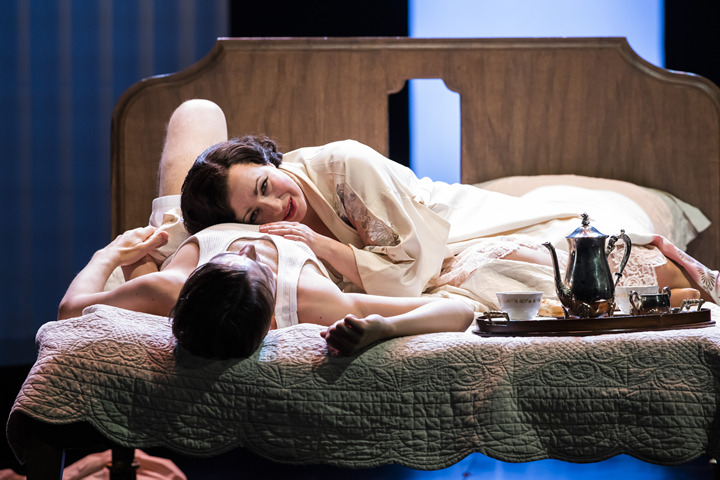| Opera Reviews | 28 April 2024 |
An elegant interpretation of this lesser-known workby Catriona Graham |
|
Puccini: La Rondine |
|
 |
|
|
Certain storylines recur in opera, like Good-time Girl meets Young Man, they fall in love, but their love is thwarted, sometimes by illness / death, or parental disapproval. Puccini wrote several versions of this story. Think of Mimi, Manon, even elements of Cio-Cio-San and Tosca – and Magda, the eponymous La Rondine. In Opera North’s production, directed by James Hurley, men in DJs and black tie come on stage and sit on black bentwood chairs ranged against white walls on either side of a deep V-shape, pointing to a giant purple vase with a humongous flower arrangement, while the orchestral players are still tuning up and having last minute practices of the difficult bits. On either side, rooms are glimpsed behind the white walls, one clearly a boudoir, in another we glimpse a man in red smoking jacket working at a desk. It turns out he is Prunier, a poet, and Elgan Llyr Thomas gives an excellent account, starting with his piano-accompanied song. When Magda joins in to finish the story, Galina Averina’s voice is so full of fervour, the on-stage applause from her guests is well-deserved. There’s a lot going on in the staging, with the men going out to a balcony to smoke. Magda’s gossipy narration of her first love to her female friends is lively and amusing, and their hamming around belies their Golden Age of Hollywood gowns. Magda’s very vocal maid, Lisette, bustles around, finally persuading Magda’s rich lover to meet the importuning stranger seeking him. and so we get to meet our hero, Ruggero, who reminds Magda of that coup de foudre she has only just told her friends about. Ruggero being persuaded that the only place to go is Bullier’s café, Magda decides to go herself. The sub-plot of Lisette and Prunier becomes more apparent, and they make an excellent pair, sparking off each other. Meanwhile, Magda (in disguise) and Ruggero have met at Bullier’s, which is crowded with revellers, choreographed by Lauren Poulton. Suddenly, in an instrumental passage, it all kicks off on the dance floor, in more senses than one, when two different couples have ‘domestics’. Sébastien Guèze’s Ruggero sounds young and ardent, pouring out his heart to Magda. The meeting between Prunier / Lisette and Ruggero / Magda is slickly done, with Ruggero kept in ignorance. Rejecting her life with rich Rambaldo (Philip Smith looking serious and slightly staid) she goes off to a love nest with Ruggero. The third act starts with Magda singing of her happiness and Ruggero hiding his face in the pillow, to emerge with a very hung-over look. After the opulence in Magda’s apartment and the blacks of Bullier’s, the light-coloured neutrals of the bedroom scene are relieved only by the blue of Ruggero’s jacket. The visit of Prunier and Lisette chips at the idyll. When Magda says she can’t marry him, Guèze’s anguish is palpable, while her own distress is vivid in her voice. Her solitary departure – as operas go, not that unhappy an ending – leaves us wondering what happens next. Kerem Hasan keeps it together, with some luscious melodic lines in the orchestral playing. Leslie Travers’ sets and Gabrielle Dalton’s costumes are enlivened by the lighting (Paule Constable and Ben Pickersgill). It all makes for an elegant interpretation of this lesser-known work. |
|
Photo © Tristram Kenton |
|







